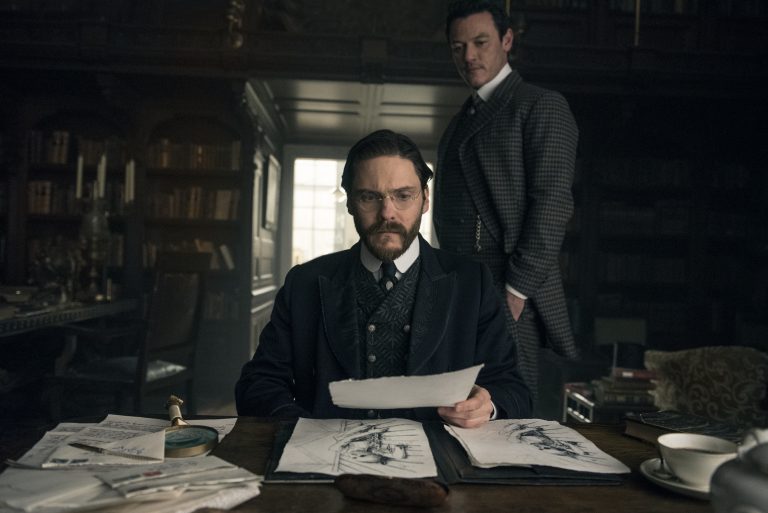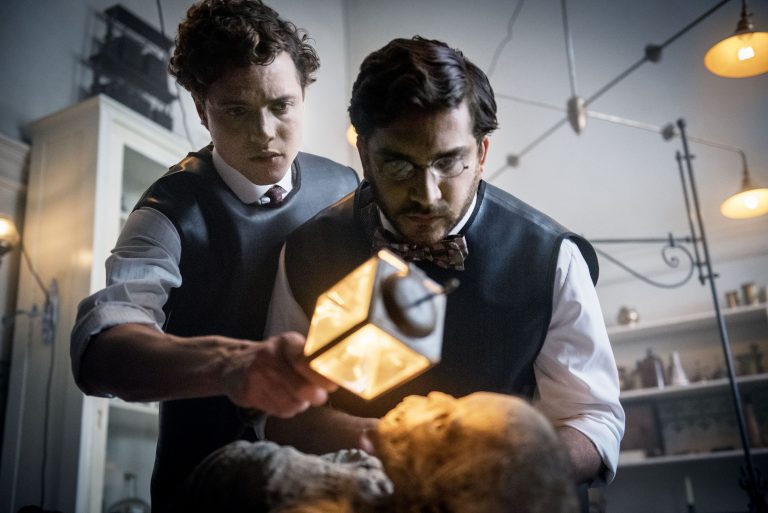Synopsis 1×01: A psychologist, a newspaper illustrator, a secretary and a police commissioner begin an investigation outside the law to find a serial killer targeting boy prostitutes in 1896 New York City.
“That’s why I like you John. You represent the good that people want to believe is in all of us. That’s why people like you more than they do me.” – Lazlo Kreizler
TNT’s adaptation of Caleb Carr’s novel, The Alienist, is a look at a ghastly murder and the killer who haunts New York City in the late 1800’s. The fictional crimes are investigated by Dr. Lazlo Kreizler (Daniel Bruhl) – a criminal psychologist, then known as an alienist – along with his friend John Moore (Luke Evans), a newspaper illustrator for The New York Times. In the pilot episode, “The Boy on the Bridge”, we are first introduced to Lazlo and John, who manage to push their way into a police investigation involving a body found on top of a bridge. The victim, a boy sex worker, is dressed as a girl and brutally disfigured and mutilated. John is sent by Lazlo to illustrate the crime scene on behalf of him, much to the chagrin of the police department.
Bruhl and Evans play an odd couple, whether it’s intentional or not. Bruhl, perhaps best known to US audiences for his roles in Inglourious Basterds and Captain America: Civil War, embodies the quintessential brooding profiler with a dark past. Meanwhile, Evans, best for his roles in The Hobbit and Beauty and the Beast, seems almost uncomfortable as John Moore. Sure, Lazlo puts him in difficult situations nearly all the time, but he constantly presents as the fish-out-of-water unless he’s in a brothel. It’s hard to tell if this is John’s own personal characteristic – it’s undoubtedly disarming to have an illustrator on such gruesome cases, especially if he apparently idealized the crime scene “like a martyred saint in a Renaissance painting” – or if Evans is waffling due to unclear direction and a poor script.
If Lazlo and John are supposed to seem distant towards each other the episode accomplishes that. The duo seems to draw inspiration from Holmes/Watson dynamic, but neither truly fulfills their role. Lazlo isn’t nearly as methodical and cold, and John lacks the sturdiness and practicability. Both characters have interesting individual threads with potential, but I’m not convinced they work well together, or even like each other that much. The sobering subject matter seems to also suck the warmth away.

On their way to the police department to report this finding, we encounter the press interviewing the old police commissioner, who seems happier to discuss his retirement and stock market speculation than even mention the murder. As our duo arrives, we see that Lazlo has an interesting relationship with the police and with the press; he’s the source of ire for the former and eager interest for the latter. While many of the beat cops and members of the force dislike Kreizler and his methods, the new police commissioner, and future U.S. president Theodore Roosevelt (played by Brian Geraghty) is open to Lazlo’s profiling and brings him on board to investigate the murder in secret. Geraghty garners a surprisingly positive reaction as Roosevelt, who is so subtle you might even miss his full name at first. The cops around him clearly have a disdain for Roosevelt, probably for his incorruptible spirit and a willingness to undo questionable police customs like lining their pockets with money from local crime bosses to turn a blind eye when it comes to unlawful practices.
It is quickly revealed that Roosevelt is not only familiar with the two, but was once a classmate alongside Lazlo and John at Harvard. Kreizler assumes that this murder is connected to another crime from three years ago. In this case, a pair of twins named Benjamin and Sophia Zweig disappeared and turned up dead. The boy, Benjamin, liked to cross-dress and when he was found, he was brutally mutilated, much like Georgio. It’s a good thing to point out that whatever faults Lazlo has, he seems to have a very modern approach to child psychology. He makes it clear that while both boys were found dressed as girls, Georgio was dressed that way because of circumstance, while Benjamin did so because it was who he was.
While at the office of the commissioner, they also meet Sara Howard, played by Dakota Fanning of Uptown Girls, Coraline, and Twilight fame. Despite Bruhl and Evans’ sometimes stodgy performances, Fanning is an inspiring figure. Although the lines she’s given are a little stiff to deliver – as is the case with almost every character, to be honest – there is certainty in her performance. Sara is Roosevelt’s secretary, she’s confident, headstrong, and proud of her position as the first woman to be working at the police department. As a woman in a man’s world, the episode is abundant with scenes that put her in situations that demonstrate just how inescapable that fact it. If she’s not being harassed by the cops, she’s being shut out of conversations for her own delicacy. Even her relationship with Moore is tinted with a past grievance over his portrayal of her in the society pages. Despite her interest in Lazlo’s work and abilities as a person, the scenes of her eating alone in a plush and luxurious dining room or removing the restrictive corsets around her torso or even simply smoking alone in the house show just how far removed she is in the culture from the men.
Lazlo asks John to approach Sara, who he wants to take the official files of Georgio’s case for him to review since Roosevelt did not agree to. Although she initially declines, she does obtain them and finds John at his usual brothel to give him the files. The interactions between John and Sara all play off of traditional gender roles. Sara is neither surprised nor incensed to find John at the brothel, while John is dramatically concerned for her sensibilities at every turn, as if she should be shielded from it. Sara hands over the files but only on the condition that she will be kept in the loop regarding the case. Triumphant, John returns to Lazlo with said files, only to realize that they are completely unhelpful.

The rest of the episode is mostly build up, and although it has its issues, the pacing and tone gain some traction than anything in the episode previously. Lazlo monologues in a revelation that he must become the killer in order to truly understand him. He say, “Only then will I come to truly understand what I am, only then will I recognize that what drives me is not an absence of emotion, no, rather a torrent of feeling, the kind that gives meaning and purpose to my own blackened soul. I must see life as he sees it, feel pain as he feels it, take the same path he takes. Yes, I must follow this where ever it goes, even if it leads me to the darkest pit of hell.” This is a common, if not well-beaten, path that we often see criminal profilers, detectives, and the lawful good tread. It’s nothing new, and while certainly The Alienist shouldn’t be punished or pushed towards sensationalism, it seems mired in topics and genres that have already been seen in pop culture.
Still, I have some hope. The episode, despite playing into every stereotype of the Gilded Age of America, has shining moment that attract. The killer, his brief scenes, are chilling and bring to mind famed serial killers like Albert Fish, a murderer and eater of children. It’s always intriguing to watch as the characters navigate the murky waters of horrific crimes. Time will tell if the series holds up and improves, but for now, The Alienist has yet to impress but we’re holding out before we make our final decision on the series, hoping for some proper pruning and refining as the story progresses.